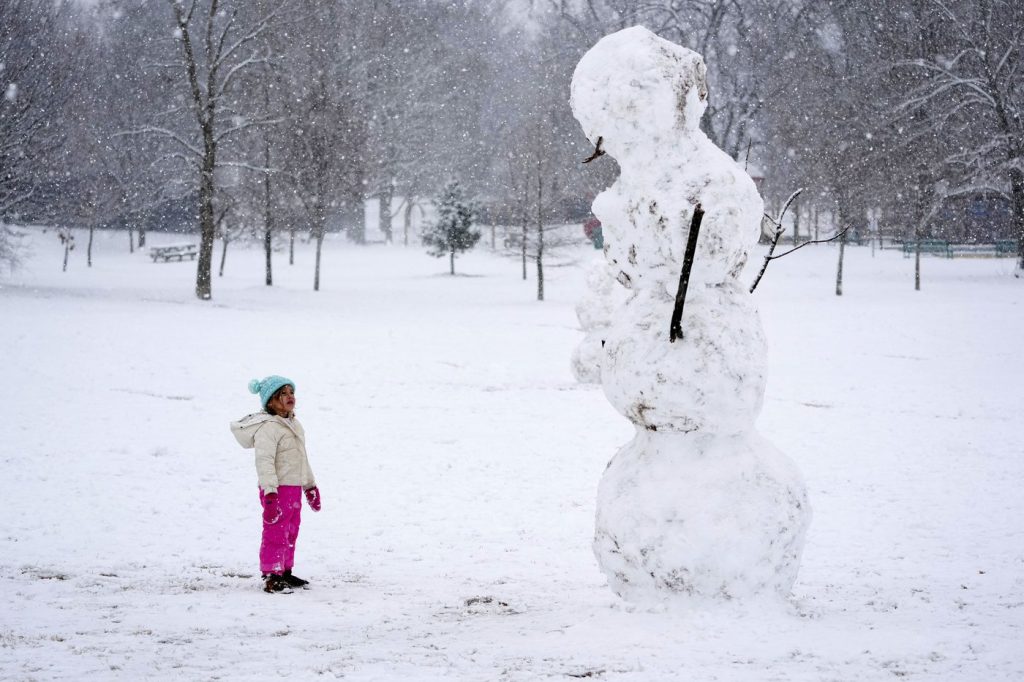ATLANTA (AP) — Snow and ice are expected to gradually thaw across the U.S. South as the weekend progresses. Major airports, including Atlanta's Hartsfield-Jackson and Charlotte Douglas in North Carolina, continued to experience disruptions on Saturday, with anticipated plunging temperatures after sundown raising concerns about re-freezing of melting snow, which could make roads hazardous.
According to Scott Carroll, a meteorologist with the National Weather Service in Atlanta, "I definitely don’t think everything’s going to completely melt." He warned that secondary roads will likely still have slushy conditions, and with the forecasted cold temperatures and clearing skies at night, the risk of treacherous roadways increases.
Airlines were already facing a backlog of cancellations and delays due to the adverse weather conditions that hampered travel on Friday. By 10 a.m. Saturday, more than 300 flights in and out of Atlanta had been canceled, and over 250 flights were delayed, according to FlightAware. In Charlotte, more than 200 flights had been canceled, while over 100 experienced delays.
Sarah Waithera Wanyoike, who resides in the Atlanta suburb of Lilburn, found herself on her second day at Hartsfield-Jackson Airport. She was aiming to catch an Ethiopian Airlines flight to Zimbabwe after arriving at the airport before sunrise on Friday. Although she boarded her flight, it never took off, and after six hours of waiting, passengers were instructed to return to the gate. Voicing her frustration, Wanyoike compared the experience to a "hostage situation." She remained at the airport as her luggage was still on the plane, and she had been advised not to leave the airport to ensure she was present when her flight was rescheduled.
On Saturday morning, Wanyoike faced another delay with her flight, amplifying her dissatisfaction with the airline’s communication. "It’s not even on the board at the airport," she expressed. Delta Air Lines, the primary carrier at the Atlanta airport, stated they were "working to recover" from the previous day's cancellations, particularly emphasizing the impact on morning flights due to crews and aircraft being misplaced after 1,100 cancellations unfolded on Friday.
Major roadways saw some clearance across the South, although few chose to travel early Saturday. Transportation officials in Georgia urged residents to avoid roads until midday, leading to the Atlanta Hawks postponing their scheduled basketball game against the Houston Rockets. The storm that had blanketed the region with snow was expected to drift out to sea off the East Coast, leaving behind snow showers in the Appalachian Mountains and parts of New England.
Following an ice storm that resulted in over 110,000 power outages in Georgia on Friday night, utility companies made progress in restoring service on Saturday. The National Weather Service reported ice accumulations around Atlanta between 0.1 to 0.25 inches (0.25 to 0.6 centimeters), which was less severe than earlier forecasts. However, officials warned that high winds could pose additional risks in areas where ice had formed on tree branches.
Earlier in the week, the storm wreaked havoc across Texas and Oklahoma, generating dangerous road conditions. Arkansas and North Carolina deployed National Guard troops to assist motorists stranded on the roads, and multiple states declared states of emergency in response to the severe weather.
Schools across a wide stretch from Texas to Georgia and as far east as South Carolina had canceled classes on Friday, providing millions of children with an unexpected snow day. This storm delivered much more snowfall than many areas typically receive in an entire year. Reports indicated that certain regions in Arkansas received up to a foot (about 31 centimeters) of snow, and Little Rock, which generally averages 3.8 inches (9.7 centimeters) annually, saw nearly 10 inches (about 25 centimeters). Moreover, Memphis International Airport in Tennessee reported over 7 inches (about 18 centimeters) of snow, while central Oklahoma and northern Texas experienced similar accumulations.
Experts have noted that phenomena like the polar vortex, which typically circulates near the North Pole, have become more frequent, possibly due to climate change. The cold snap this winter coincided with unusual wildfires in Southern California, creating a striking contrast across the different regions affected by the extreme weather conditions.










